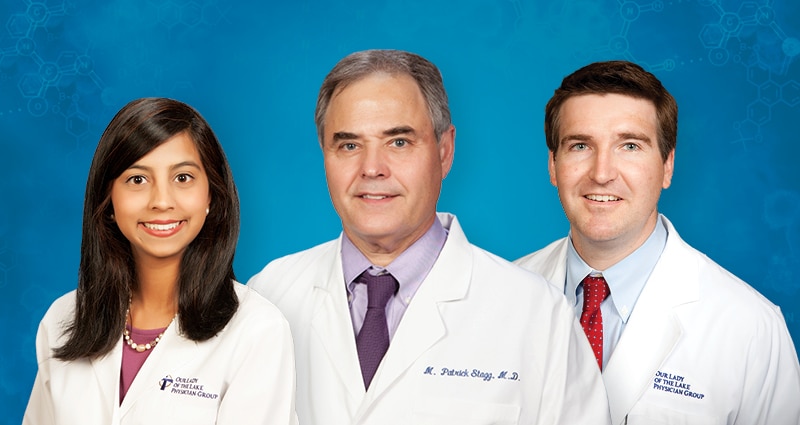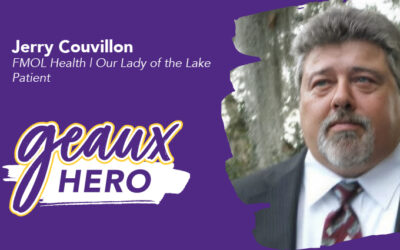The ongoing fight against cancer is first and foremost about providing the best treatment to patients so they can have a long and healthy life. At Our Lady of the Lake Health and through Our Lady of the Lake Cancer Institute, a big part of that fight is through research.
Every day, our doctors, oncologists and medical professionals are conducting and taking part in major research studies that seek to improve care for cancer patients and help find a cure. They are also enrolling patients in the latest clinical trials to find innovative new alternatives to traditional cancer treatment.
We asked three of our cancer research leaders about the work they do and what motivates them to continue the fight.
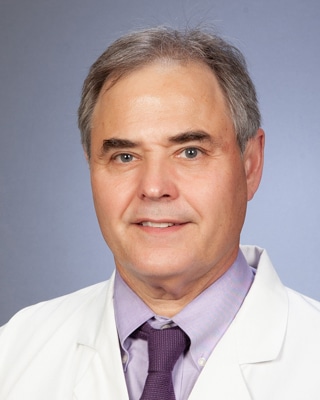
Patrick Stagg, MD
Hematology / Oncology
What inspired you to pursue cancer research?
The reason I decided to pursue cancer research is because most advances in cancer have to come through research. While cancer cure rates are improving, they are not where we need them to be, so we need to continue to move the needle forward in this field.
Tell us about a recent cancer research project you’ve completed that you’re particularly excited about.
We just completed the initial phase of an endometrial cancer screening project that will be submitted for publication. We are going to continue this project in hopes of developing an effective screening program for this rapidly growing malignancy.
What about a project you are currently working on?
We are excited about bringing bispecifics (engineered antibodies) to the lung cancer world. We have a new study with a bispecific drug to treat small cell lung cancer that looks promising. We are also looking forward to pursuing the endometrial screening project in partnership with Pennington Biomedical Research Center and Woman’s Hospital.
What’s one thing most people don’t realize about the research work done at Our Lady of the Lake?
The Research Office performs a large volume of research that is robust and rapidly growing. The scope of clinical research offered at Our Lady of the Lake includes investigator-initiated studies, pharmaceutical-sponsored studies and NCI-funded research.
What motivates you most about the future of cancer research?
The opportunity to address unmet needs, improve cancer survival rates and offer innovative treatments close to home for Louisiana and Gulf South patients.
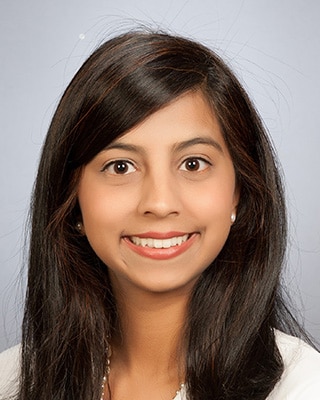
Sobia Ozair, MD
Hematology / Oncology
What inspired you to pursue cancer research?
The fact that research leads to discoveries that can potentially change people’s lives.
Tell us about a recent cancer research project you’ve completed that you’re particularly excited about.
We most recently had a clinical trial that revealed practice-changing results – the addition of immunotherapy with chemotherapy in advanced uterine cancer. We also had similar clinical trials that looked at the addition of immunotherapy to chemotherapy for advanced endometrial cancer, and the addition of immunotherapy to chemotherapy with radiation for cervical cancer.
What’s one thing most people don’t realize about the research work done at Our Lady of the Lake?
People may not even realize that we have clinical trials at Our Lady of the Lake. Clinical trials are designed to help us learn if a new treatment is more effective or has less harmful side effects than existing treatments.
Why should a patient choose Our Lady of the Lake for a clinical trial?
At our institution, patients have support to help them succeed. From the doctors and nurses to the research nurses and nurse navigators, we are here to support them through their cancer journey.
Why is this work so important to our patients?
Cancer research can and has saved lives. The purpose and importance of research is to develop safe and effective methods to prevent, detect, diagnose and treat cancers.
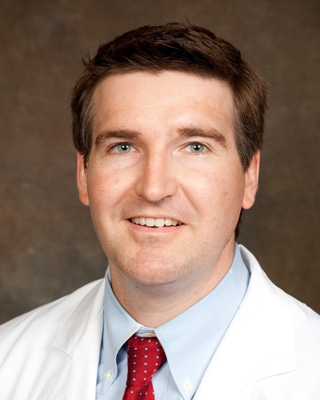
John Lyons III, MD
Surgical Oncologist
What inspired you to pursue cancer research?
Cancer research is an opportunity to move the needle forward. A lot of the research I do looks at cancer outcomes in the state of Louisiana. We look at disparities, we look at disenfranchised populations of cancer patients, and we identify opportunities for improvement, then study these interventions.
What is a cancer research project you’ve completed that you’re particularly proud of?
A project I’m particularly fond of had to do with analyzing the effects of Medicaid expansion in the state of Louisiana in July 2016. We compared the outcomes of patients with breast cancer prior to Medicaid expansion to the outcomes following expansion. We found that breast cancer patients were diagnosed at a much earlier stage following expansion than they had been prior. This implies an overall improvement in breast cancer survival. This is an example of where the system worked to help patients – improving healthcare coverage and improving access to care actually improved patient outcomes.
We recently repeated this study looking at colon cancer patients in Louisiana and found that patients with colon cancer were significantly more likely to receive cancer treatment (surgery and chemotherapy) following Medicaid expansion than in the years that preceded it. This is the first study in which Medicaid expansion has been associated with increased treatment for colon cancer in the United States.
What’s one thing most people don’t realize about the research work done at Our Lady of the Lake?
Our collaboration with LSU has really increased the level of research commitment, and the depth of research that is being done in many arenas. There are groundbreaking studies being conducted in pulmonary disease, morbid obesity, in sepsis – just to name a few – and of course in cancer as well. We are one of the top sites for clinical trial accruals in the state. And the number of patients we enroll in clinical trials increases year over year.
Why should a patient choose Our Lady of the Lake for a clinical trial?
We have a very robust research department that does a very good job enrolling patients in clinical trials, answering questions before, during and after enrollment. We take care of a very broad cross section of patients with very diverse backgrounds, and I think this makes our center sensitive to the needs of certain populations and makes us very good at walking people through the trial participation process.

